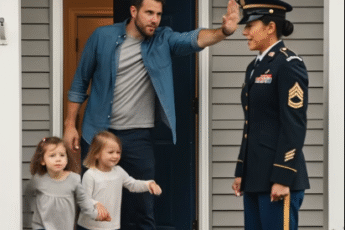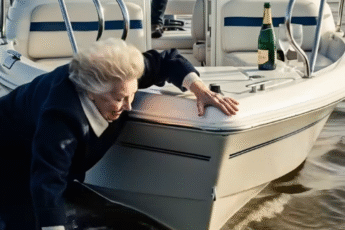“I need to ask you something strange. Your husband… is he home right now?”
My sister Kaye’s voice crackled through the phone, a tinny whisper from the cockpit of United Flight 447, somewhere over the Atlantic. I stood in our Manhattan apartment kitchen, the aroma of freshly ground coffee filling the air. Through the doorway, I could see Aiden, my husband of seven years, sitting in his favorite armchair, engrossed in the morning paper.
“Yes,” I said slowly, a knot of confusion tightening in my stomach. “He’s right here. In the living room.”
The silence that followed stretched, thin and wrong. Then Kaye whispered the words that would shatter my entire world.
“That can’t be true, Ava. Because I’m watching him with another woman right now. They just boarded my flight to Paris.”
Behind me, I heard footsteps. Aiden walked into the kitchen, coffee mug in hand, smiling at me with the same easy, familiar expression he’d worn every morning for the past seven years.
The mug in his hand was one I’d bought him for his 40th birthday. White ceramic with “World’s Most Adequate Husband” printed in black letters. He’d laughed when he opened it, saying it was perfect because he never trusted anyone who claimed to be the best. That was three years ago, back when his self-deprecating humor felt charming instead of calculated.
“Who’s calling so early?” Aiden asked, moving toward the coffee maker. His Saturday morning routine was a comforting, unvarying ballet: coffee, the Financial Times, then his squash game at the athletic club by eleven.
I gripped the phone tighter, Kaye’s ragged breathing audible on the other end. She was waiting for me to make sense of the impossible. My husband stood five feet away from me. My husband was also, apparently, settling into a business class seat at JFK with another woman.
“Just Kaye,” I managed, surprised at how steady my voice sounded. “Pre-flight check-in.”
Aiden nodded absently, pouring coffee while scrolling through his phone. “Tell her hello. Maybe we’ll finally take her up on those flight benefits she’s always offering.”
The irony was a physical blow. I watched him move through our kitchen, a space defined by our shared history—where we kept the sugar, how he liked his coffee, the way he always stood at the counter.
“Kaye, I’ll call you back,” I said quietly into the phone.
“Ava, wait,” she pleaded, her voice carrying the same urgent terror it had three years ago when she’d called about Dad’s heart attack. “I need to tell you—”
“I’ll call you back,” I repeated, and ended the call.
Aiden glanced up. “Everything alright? You look pale.”
I caught my reflection in the microwave door. Same auburn hair, same green eyes. Same face that had looked back at me for thirty-seven years. But something fundamental had shifted. The kitchen felt like a stage set, and I was an actor who’d forgotten her lines.
“Just tired,” I said. Twenty years as a forensic accountant had taught me one thing: maintain composure when you discover nothing is what it seems.
My phone buzzed. A text from Kaye. Look at this. NOW.
A photo appeared. Taken through a cockpit window, looking back into business class. There, in seat 3B, was a man in a blue Tom Ford suit. The profile was unmistakable. The way he held his head, the curve of his jaw, the specific way he gestured while talking to a young blonde woman whose hand rested on his forearm with a casual, devastating intimacy. It was Aiden. My Aiden.
I looked up at the Aiden in my kitchen, wearing a gray cashmere sweater, his reading glasses pushed into his hair, the same wedding ring on his left hand.
“Actually,” I said, my voice a marvel of control, “I think I’ll make pancakes.”
“Pancakes?” He raised an eyebrow. “On a Tuesday? What’s the occasion?”
The occasion was that one of these realities had to be a lie. “Can’t a wife make pancakes for her husband without a reason?”
He smiled, that particular half-smile that used to make my heart leap. “Of course. Though, you know I have squash at eleven.”
“Plenty of time,” I said, pulling flour and eggs from the pantry. Simple things. Things that made sense. Unlike the man who existed in two places at once.
The moment the apartment door closed behind Aiden, I moved. His home office, a meticulously organized space of mahogany and leather, was the epicenter of a life I now realized might be a complete fabrication. Organization, I knew from years of tracking embezzled funds, was often a mask for the most elaborate deceptions.
Our credit card statements revealed a pattern that made my chest tighten. A charge from the Tokyo Mandarin Oriental in March, a weekend he’d supposedly spent helping his mother in Connecticut. The charge was for two guests. Spa treatments for two. Room service for two. There were other hotels, other restaurants, jewelry purchases from Cartier that had never been gifts for me.
My phone rang. It was Sophia Chen, my old college roommate, now a specialist in what she called “marital reconnaissance.”
“I’m fifteen minutes away,” she said without preamble. “Ava, you need to prepare yourself. What I found… it’s extensive.”
While I waited, I uncovered withdrawals from our investment accounts—thousands of dollars at a time, just below the threshold that would trigger an alert. The kind of systematic siphoning I’d seen in countless fraud cases.
Sophia arrived, her expression grim. “The woman your sister saw him with is Madison Veil, twenty-six, a pharmaceutical sales rep,” she began, pulling up photos on her tablet. Madison and Aiden at a hotel bar in Miami. Madison and Aiden at a charity gala the same night I’d been in Boston for a conference.
“But Ava,” Sophia said, her voice low, “that’s not the strangest part.” She pulled up our building’s security footage. There was Aiden, entering the lobby last Tuesday. But his shadow fell at the wrong angle. It flickered. “This is deepfake technology,” she explained. “Sophisticated, expensive. Someone has been inserting fabricated footage into your building’s security system.”
The room tilted. “But… I came home and he was here,” I stammered.
“Was he?” she asked gently. “Or was it someone who just looked like him?”
That evening, I set a trap. I prepared shrimp scampi, my grandmother’s recipe, filling the apartment with the rich aroma of garlic and white wine. The real Aiden had a severe, life-threatening shellfish allergy. He wore a medical alert bracelet for it.
The man who walked through the door at 5:30 kissed me, told me dinner smelled amazing, and sat down at the table.
“Your favorite,” I said, setting the plate in front of him.
He picked up his fork without a flicker of hesitation and took a bite. “This is incredible,” he said, smiling. “Your grandmother would be proud.”
I watched him eat, my heart pounding a frantic, silent rhythm. No reaction. No swelling. No reaching for an EpiPen. Just a man enjoying a meal that should have killed my husband.
I refilled his wine. “I was thinking,” I said, my voice a perfect imitation of a loving wife, “we should visit your mother this weekend.”
The real Aiden detested his mother. Their relationship was a toxic battlefield. He would have manufactured any excuse to avoid it.
“That sounds wonderful,” this man replied, his smile genuine. “She’ll be thrilled to see us.”
He was failing every test while perfectly succeeding at being a better, more agreeable version of the man I married. That night, after he fell asleep—instantly, unlike the insomniac Aiden I knew—I slipped out of bed. In his briefcase, beneath a stack of portfolios, I found it. A paystub made out to a “Marcus Webb.” An actor’s union card. And handwritten notes, pages of them, a script for playing the part of my husband. “Ava likes her coffee with one sugar… Anniversary is October 15th, expects flowers… Father died three years ago, sensitive subject.” Our entire marriage, reduced to a character study.
At the bottom of the last page: “Three months maximum. Maintain cover until transfer complete.”
The discovery of the script, the actor, the three-month timeline—it was the key that unlocked everything. This wasn’t a simple affair. It was a meticulously planned operation.
I called Grace Morrison, a sharp-witted former prosecutor and an old friend. She arrived at my office on a Sunday morning, her expression shifting from sleepy irritation to focused intensity as I laid out the evidence.
“This is professional-level identity theft, financial fraud, and corporate espionage,” she said, her legal mind already building the case. “But here’s your problem: without the real Aiden to contradict the story, this actor could claim he was hired for some bizarre but legitimate reason. The authorities won’t act fast enough. By the time they do, the money will be gone.”
Just then, the encrypted phone Sophia gave me buzzed. A text from an unknown number: “Check Aiden’s old phone.”
A breadcrumb. We rushed back to the apartment. In a drawer of old electronics, I found Aiden’s previous iPhone, the one with the cracked screen. It powered on, a flicker of life. And it had been receiving messages for months. A thread with Madison Veil, going back eight months, laid the entire conspiracy bare.
Aiden: “The wife suspects nothing. Marcus is perfect. By the time she figures it out, we’ll be untouchable.”
The most recent message was from yesterday: “Tomorrow, we finalize everything. Our usual place in Paris, then disappear forever.”
“Tomorrow is Monday,” Grace said, her voice grim. “We need to act tonight.”
A cold determination washed over me. Aiden may have stolen my money and my life, but he had forgotten one crucial detail: I was the one who knew how to track it. I went to my laptop and created a financial virus, an elegant piece of code disguised as routine investment documents. It was designed to activate the moment anyone accessed our joint accounts from an international IP address. When triggered, it would freeze every transaction, lock down every associated account, and simultaneously alert federal investigators.
“Is that legal?” Grace asked, watching over my shoulder.
“It’s my account,” I said. “I’m protecting my assets.”
The trap was set. Now, I just needed the rats to walk into it.
The next morning, I threw a party. I had Marcus, the actor, send out an urgent, exclusive invitation to all of Aiden’s colleagues and biggest clients for a “surprise anniversary celebration” at our apartment at 7:30 AM. He was terrified, but he was trapped in his role. By 7:30, our living room was filled with bewildered but influential investment bankers, all sipping coffee and making awkward small talk.
At 7:58 AM, the doorbell rang. It was the FBI.
The lead agent, a woman with steel-gray hair and eyes that missed nothing, held up her credentials as six agents filed into the room. “We’re looking for Aiden Mercer.”
“That’s me,” Marcus said, his Brooklyn accent finally breaking through the British veneer. “Except it’s not.” He looked at the agent with desperate relief. “I want to cooperate.”
The room erupted in confused murmurs. I played the recording of Kaye’s phone call, her voice filling the stunned silence. As comprehension dawned on the faces of Aiden’s colleagues, Agent Brennan addressed the room.
“The man you know as Aiden Mercer,” she announced, “has been stealing corporate secrets and facilitating insider trading using information obtained through his wife’s work. The man you’ve been meeting with for the past three months was Mr. Webb, an actor hired to maintain the illusion while the real Aiden Mercer attempted to flee the country.”
Just then, my laptop chimed. The virus had activated. On my screen, I watched in real time as $47 million in stolen funds froze in accounts across the Caymans, Switzerland, and Cyprus.
Agent Brennan’s phone buzzed. She listened, then looked at me. “French authorities have Aiden Mercer and Madison Veil in custody at Charles de Gaulle. They were attempting to board a flight to Switzerland.”
The apartment, once our home, was now a crime scene. As Aiden’s carefully constructed world crumbled, I stood amidst the wreckage, not as a victim, but as the architect of his downfall. He had underestimated the quiet woman who made him pancakes. He had forgotten that a forensic accountant always finds the truth. And he had never imagined that the “World’s Most Adequate Husband” had a wife who was, in the end, far more than his match.





